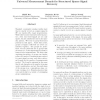Free Online Productivity Tools
i2Speak
i2Symbol
i2OCR
iTex2Img
iWeb2Print
iWeb2Shot
i2Type
iPdf2Split
iPdf2Merge
i2Bopomofo
i2Arabic
i2Style
i2Image
i2PDF
iLatex2Rtf
Sci2ools
JMLR
2012
2012
Universal Measurement Bounds for Structured Sparse Signal Recovery
Standard compressive sensing results state that to exactly recover an s sparse signal in Rp , one requires O(s · log p) measurements. While this bound is extremely useful in practice, often real world signals are not only sparse, but also exhibit structure in the sparsity pattern. We focus on group-structured patterns in this paper. Under this model, groups of signal coefficients are active (or inactive) together. The groups are predefined, but the particular set of groups that are active (i.e., in the signal support) must be learned from measurements. We show that exploiting knowledge of groups can further reduce the number of measurements required for exact signal recovery, and derive universal bounds for the number of measurements needed. The bound is universal in the sense that it only depends on the number of groups under consideration, and not the particulars of the groups (e.g., compositions, sizes, extents, overlaps, etc.). Experiments show that our result holds for a variet...
Related Content
| Added | 27 Sep 2012 |
| Updated | 27 Sep 2012 |
| Type | Journal |
| Year | 2012 |
| Where | JMLR |
| Authors | Nikhil S. Rao, Ben Recht, Robert D. Nowak |
Comments (0)

